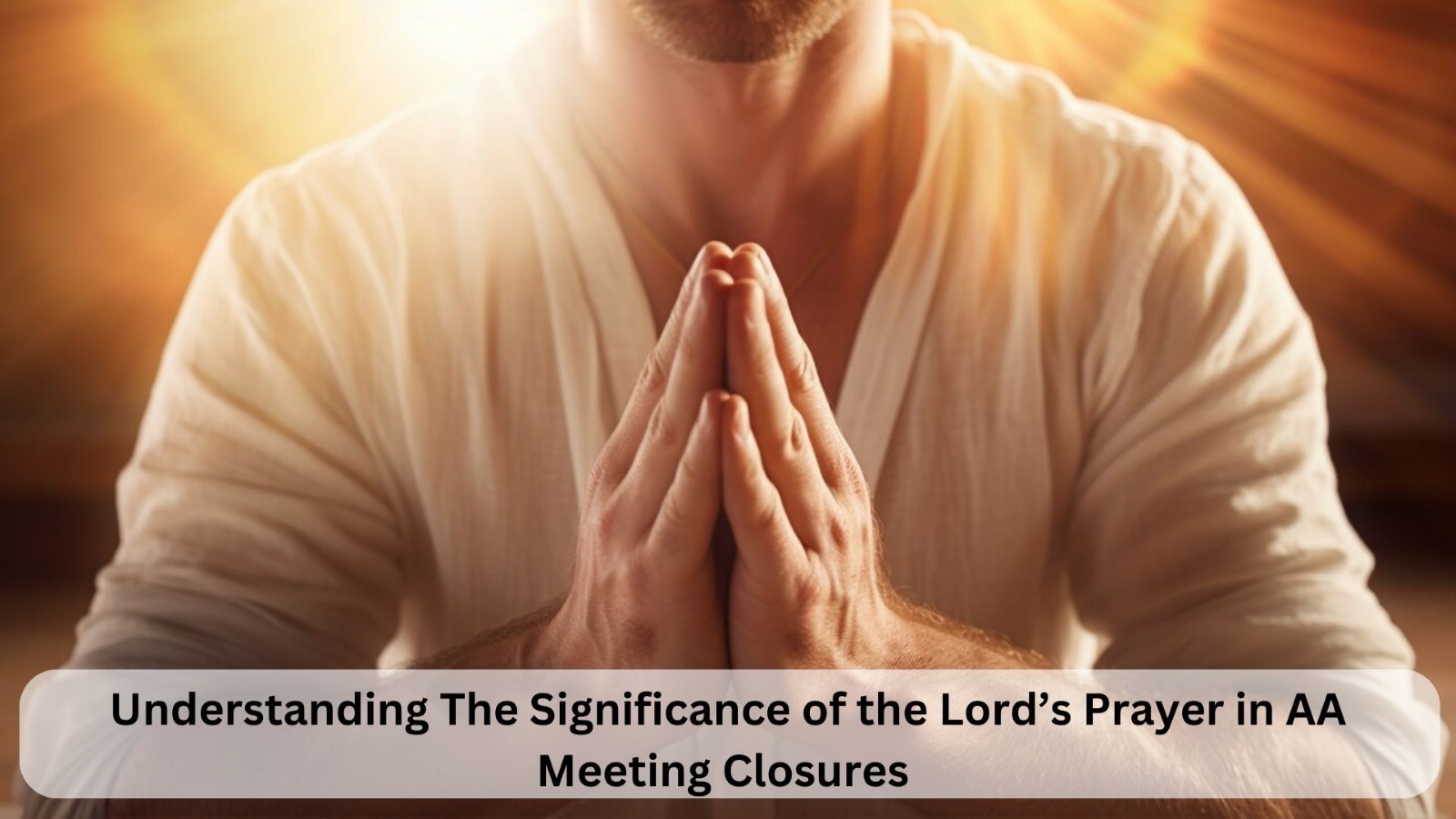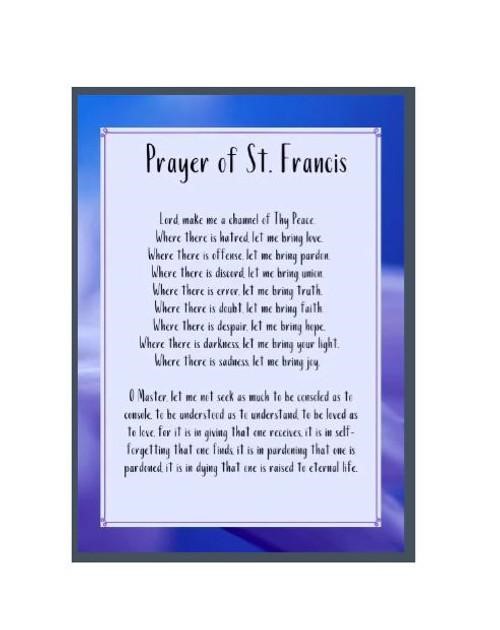Understanding The Significance of the Lord’s Prayer in AA Meeting Closures
Posted by Daniella Park on 16th Oct 2024

After spending some time with his disciples, Jesus Christ, being a diligent and observant teacher, noted that the twelve were constantly struggling to pray. He then took the liberty of teaching them the famous Lord's Prayer.
The Lord's Prayer appears in two of the Synoptic Gospels - Matthew and Luke. Prayer has become the world's most popular non-poetic invocation, transcending religious and cultural barriers.
One notable place where the Lord's Prayer has found its eminence is in AA meetings. These glorious words are often recited as the closing meeting prayer during AA’s 12-step recovery programs.
In this blog, we shall uncover the significance of the Lord’s Prayer in addiction recovery and why it remains an enduring pillar of AA meetings. But first things first.

Introducing AA
Alcoholics Anonymous (AA) is a global network of people who come together to discuss and find solutions to alcohol addiction.
Members can anonymously discuss their struggles with alcoholism, as former addicts share useful insights on effective interventions for alcohol misuse.
Exploring AA's 12-Step Program
Alcoholics Anonymous maintains a robust set of principles designed to guide recovering addicts on their journey to full sobriety. These principles are outlined in a 12-part course of action commonly known as the Twelve Steps of Alcoholics Anonymous.
Each AA step requires participants to make special commitments. They include;
- Acceptance - Admitting you have a drinking problem and purposefully resolving to quit.
- Faith - Acknowledging the existence of a higher power than yourself, one whose influence will be significant in keeping you on track as you journey further from alcohol addiction.
- Surrender - Embracing the higher power by surrendering fully to their will.
- Soul Searching - Taking stock of your achievements so far.
- Integrity - Staying honest and true to yourself, no matter how overwhelming drinking urges may be.
- Admission - Accepting that you were misguided to slip into alcoholism but recommitting to stay on the sobriety course.
- Humility - Demonstrating respect for everyone, including those still drowning in alcoholism.
- Willingness - Expressing a desire to make amends for your mistakes and the wasted years.
- Forgiveness - Forgiving those in the past who hurt you while also seeking forgiveness.
- Maintenance - Taking stock of your progress while continually adopting healthy behaviors.
- Making Contact - Reaching back to your higher power for purpose and meaning in your life.
- Service - Leveraging your success story to inspire the world around you.
Note that AA's 12-step programdoesn't always follow a linear sequence. So, it's perfectly okay to master the 12th concept before the first one.
Note that AA's 12-step programdoesn't always follow a linear sequence. So, it's perfectly okay to master the 12th concept before the first one.

Place of the Lord’s Prayer in AA Meetings
Alcoholics Anonymous emphasizes mutual help through its 12-step program. By sharing useful recovery tips anonymously, AA believes that those struggling with alcoholism can achieve and maintain total abstinence.
The Lord’s Prayer has since become an inseparable part of AA’s 12-step recovery programs, commonly recited at the closure of each meeting.
Like anyAlcoholics Anonymous prayer, the Lord’s Prayer has one overarching goal - to help recovering addicts tap into divine intervention.
How Did the Lord’s Prayer Find Its Way to AA?
The Lord's Prayer appears prominently in Dr. Bob and the Good Oldtimers, a bibliography by one of AA's co-founders. In this book, Robert Holbrook Smith (more endearingly known as Dr. Bob) asserts that the Lord's Prayer existed in Alcoholics Anonymous from as early as 1937.
Only three years after founding Alcoholics Anonymous, the fellowship had not developed its literature. There were no AA quotes or official AA meeting prayers. As such, it was necessary to reinforce the recovery programs with existing prayers.
AA founders settled on the Lord's Prayer, considering that many addicts were already familiar with it.

How the Lord’s Prayer Can Make a Difference for Recovering Addicts
Prayer can have a tremendously positive impact on substance abusers.
For starters, reciting a prayer can add meaning and purpose to a dejected soul. In the case of alcohol misuse, the Lord’s Prayer may nudge chronic addicts to make a sober decision and quit before alcohol takes a heavy toll on their lives.
Another benefit of prayer for recovering addicts is that it helps cultivate spiritual strength. Whispering the Lord's Prayer at the end of every 12-step program connects you with a higher power. By meditatively saying the words “may your will be done on earth as it is in heaven,” you’re openly admitting that while the road ahead is fraught with challenges, you can lay your trust in an unfailing power.
Like other AA prayers, the Lord’s Prayer serves as a stark reminder that alcoholism is a disease of the body, mind, and soul. Saying the prayer enables us to harness the divine power required to bring all three facets to complete harmony.
Moreover, the Lord’s Prayer resonates with other AA invocations. For instance, the AA seventh step prayer is an admission of weakness and an appeal for divine intervention. Those very sentiments resound throughout the Lord’s Prayer.
Last but not least, the Lord’s Prayer is an outward expression of our hope for a brighter, addiction-free future. It’s a nudge to be steadfast in our newfound journey to abstinence. After all, where there’s hope, there’s life.
What Does Research Say?
The impact of prayer in treating alcohol abuse has been adequately researched and well-documented. In one study, researchers found that while prayer had no direct clinical benefits, addicts who prayed often demonstrated less drinking.
While it wasn't immediately clear how constant prayer reduced drinking frequency, researchers inferred that it had much to do with embracing a healthier routine. Each moment spent in prayer, be it the Lord’s Prayer or other AA invocations like the 7th step prayer, relieves you from the emotional burden of negative thoughts.
The fact that prayer resonates with mindfulness makes it all the more effective at fending off alcohol cues. It allows you to arrest your mind to the present moment rather than let your thoughts venture into wild imaginations.

Wrap Up
The AA Lord's Prayer is an expression of faith and hope for recovering alcoholics. Reciting the prayer at the end of Alcoholics Anonymous meetings is a bold and open admission that you’re surrendering your struggles to a higher, omnipotent entity.
However, like any invocation, the trick is to say the Lord’s Prayer like you mean it. Carefully meditate upon each word rather than merely chanting it ritualistically. Remember, you need to be in the zone to summon divine intervention.


